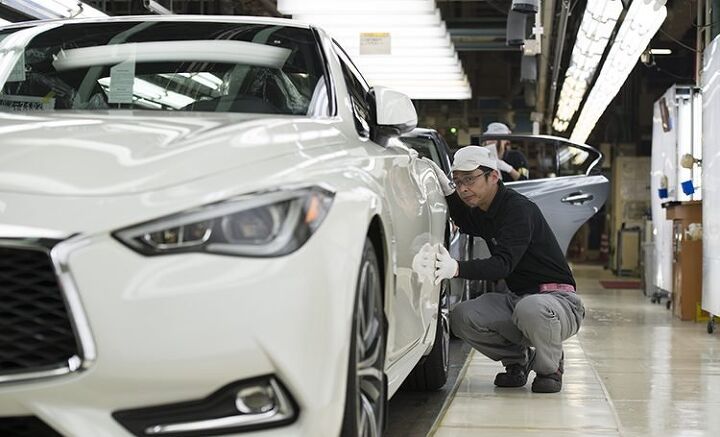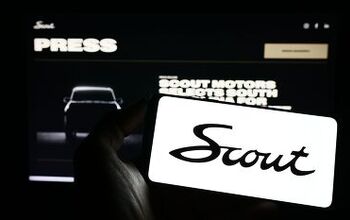Nissan Cites Staffing Issues as Cause for Final Inspection Snafu, Subaru Says Sorry

On Friday, Nissan Motor Co. blamed a shortage of key staff for improper final inspection procedures at Japanese assembly plants. The problem, which amounts to little more than not having having a specially certified technician give each vehicle a final once-over, has forced the automaker to recall 1.2 million vehicles within Japan this year. As the mandate applies only to vehicles sold on the nation’s domestic market, no exports to North America are affected.
However, that hasn’t stopped Japan’s government from coming down hard on the company for its bureaucratic misstep. After discovering that uncertified inspectors were signing off on vehicle checks required by the transport ministry, Nissan has been incredibly apologetic. It even launched a full-scale investigation, finding that “nonconforming final inspections” were commonplace by the 1990s at the plants, and could even have existed at one factory since 1979.
In a press release, the manufacturer said “Headcount reduction rates allocated to each plant applied uniformly across the whole plant, and special consideration was not given to secure final inspectors,” and included a breakdown of the entire inspection process. “Therefore, the plants had a shortage or no surplus in the number of final inspectors.”
Basically, it forgot to hire replacement technicians with the certifications required. As years progressed, that deficit only grew in scope. Subaru was also caught up in using uncertified staff to conduct final inspections fore reasons that appear to be similar in nature. The firm is preparing to recall almost 400,000 vehicles in Japan to have them reinspected by qualified employees. It estimated in an earlier proposal that 250,000 cars would cost the automaker around $44 million.
“I’m distressed that our company is responsible for something that could cast doubt on the quality of Japanese manufacturing,” Yasuyuki Yoshinaga, chief executive of Subaru, said in a news conference on Friday. “This will be reported around the world.”
Subaru has been exceptionally apologetic since being caught, but Nissan has been so humble and remorseful that I actually feel a little sorry for it. Hiroto Saikawa, who was appointed Nissan’s chief executive in April in to succeed Carlos Ghosn, even said he would return part of his salary to apologize for the scandal. He announced his dismay and concern that nobody had caught the mistake years earlier. Nissan’s cooperate stance on the matter is that its “kanken” (the inspection management team) failed Japan, creating a loss of trust in the company with the Japanese Ministry of Land, Infrastructure, Transport, and Tourism.
However, Nissan did screw up. Inspectors knowingly skirted the rules. The company’s report even said there were special ledgers designed to keep track of the official stamps that could only be used by qualified inspectors that were loaned for use by inspectors in training to certify cars.
“From the shop floor standpoint, there was a gap between the reality and the requirements for certifying final inspectors, which we didn’t resolve, and which resulted in non-compliance,” Saikawa explained.
Nissan said it would increase the total number of certified inspectors by about 85 by the end of March. Meanwhile, production speeds have been crippled at a handful of plants and may remain slow as the company works on its staffing and certification problem. The automaker even said that some exported vehicles may be affected while it attempts to remedy the situation and improve compliance at home. It is assigning a new corporate vice president to oversee all plants in Japan and expects to drop over $222 million on a domestic recall.
[Image: Nissan]

A staunch consumer advocate tracking industry trends and regulation. Before joining TTAC, Matt spent a decade working for marketing and research firms based in NYC. Clients included several of the world’s largest automakers, global tire brands, and aftermarket part suppliers. Dissatisfied with the corporate world and resentful of having to wear suits everyday, he pivoted to writing about cars. Since then, that man has become an ardent supporter of the right-to-repair movement, been interviewed on the auto industry by national radio broadcasts, driven more rental cars than anyone ever should, participated in amateur rallying events, and received the requisite minimum training as sanctioned by the SCCA. Handy with a wrench, Matt grew up surrounded by Detroit auto workers and managed to get a pizza delivery job before he was legally eligible. He later found himself driving box trucks through Manhattan, guaranteeing future sympathy for actual truckers. He continues to conduct research pertaining to the automotive sector as an independent contractor and has since moved back to his native Michigan, closer to where the cars are born. A contrarian, Matt claims to prefer understeer — stating that front and all-wheel drive vehicles cater best to his driving style.
More by Matt Posky
Latest Car Reviews
Read moreLatest Product Reviews
Read moreRecent Comments
- MaintenanceCosts The Supercharger network is something with much more growth potential than their actual car building operations, which has been marvelously run to this point and has a years-long head start on all its competitors, and Elon lays the whole team off?I don't know if it's distraction or the drugs, but he is not making good decisions and should not be CEO anymore.
- Dirk Wiggler I drive down the Palisades and near the George Washington Bridge I see FIAT housing complex (apartments, same font as the auto company). Seems like they tout energy/electric efficiency. I always wonder, 'what's that...is it really the same FIAT?'
- The Oracle Massive job cuts at their state-funded facility in Buffalo. Tesla is quick to throw resources at programs to get them launched, and quick to contract when the models are in serial production:
- Cprescott Golf carts were so 1900 and so 2020. Everyone who wants one has one and is trading them in for hybrids.
- Cprescott If it were Honduh or Toyoduh's I would set it on fire.


































Comments
Join the conversation
Do they keep the best cars for the home market, then?
"We were hoping the inspection requirement would die off and nobody would notice we haven't been doing it."